#UK employment legislation
Explore tagged Tumblr posts
Text
#UNICEF UK#job vacancy#People Policy Specialist#HR policies#UK employment legislation#inclusive culture#workplace diversity#equity#inclusion#HR advisory#policy development#UNICEF values#flexible working#annual leave#pension#open plan office#Queen Elizabeth Olympic Park#diversity recruitment#minority ethnic candidates#LGBTQ+ candidates#disabled candidates#men#equality#diversity#flexible working requirements#workplace equality#criminal records check#online applications#Supporter Care#charity
1 note
·
View note
Text



Palace of the Republic, Berlin
The right to work at a job of one’s own choice was guaranteed by the East German constitution (Aus erster Hand, 1987). While there were some (mostly alcoholics) who continuously refused to show up for jobs offered by the state, their numbers represented only about 0.2% of the entire East German work force, and only 0.1% of the scheduled work hours of the rest of the labor force was lost due to unexcused absences (Krakat, 1996). These findings are especially noteworthy, given that people were generally protected from being fired (or otherwise penalized) for failing to show up for work or for not working productively (Thuet, 1985). The importance of the communist characteristic of full employment to workers is reflected in a 1999 survey of eastern Germans that indicated about 70% of them felt they had meaningfully less job security in the unified capitalist country in the 1990s than they did in communist East Germany (Kramm, 1999)
The Triumph of Evil, A. Murphy (2002)
The GDR had more theatres per capita than any other country in the world and in no other country were there more orchestras in relation to population size or territory. With 90 professional orchestras, GDR citizens had three times more opportunity of accessing live music, than those in the FRG, 7.5 times more than in the USA and 30 times more than in the UK. It also had one of the world’s highest book publishing figures. This small country with its very limited economic resources, even in the fifties was spending double the amount on cultural activities as the FRG. Every town of 30,000 or more inhabitants in the GDR had its theatre and cinema as well as other cultural venues. [...] Subsidised tickets to the theatre and concerts were always priced so that everyone could afford to go. Many factories and institutions had regular block-bookings for their workers which were avidly taken up. School pupils from the age of 14 were also encouraged to go to the theatre once a month and schools were able to obtain subsidised tickets. [...] All towns and even many villages had their own ‘Houses of Culture’, owned by the local communities and open for all to use. These were places that offered performance venues, workshop space and facilities for celebratory gatherings, discos, drama groups etc. There was a lively culture of local music and folk-song groups, as well as classical musical performance.
Stasi State or Socialist Paradise? The German Democratic Republic and What Became of It, Bruni de la Motte and John Green (2015)
Work itself was elevated to a place of pride and esteem and, even if you were in a lower paid job, you were valued for the work you did as a necessary contribution to the functioning of society. The socialist countries were also designated ‘workers’ states and it was not merely an empty phrase when the GDR government argued that the workers, who produced the commodities that society needed, should be placed at the forefront of society. Those who did heavy manual work, like miners or steel workers, enjoyed certain privileges: better wages and health care than those in less strenuous or dangerous professions. The GDR had one of the most comprehensive workers’ rights legislation of any other country in the world. From 1950 onwards, there was a guaranteed right to work. This right applied to everybody, including disabled people and those with criminal records. Employers were made responsible for the training and integration of everyone. This meant that everybody felt they had a place in society and were needed. This was particularly important for disabled people and those who wanted a new start in life after being convicted of a crime. Working people were under a much more relaxed discipline in the workplace. Because there was job security and it was almost impossible to be sacked, an authoritarian discipline was difficult, if not impossible, to achieve. In Western countries work discipline is invariably enforced by the implicit threat of job loss. In the GDR, only in cases of serious misconduct or incompetence would employees be sacked. There were individual cases where employees were sacked illegally for what was considered ‘oppositional’ or ‘anti-state behaviour’, but usually the sanction would involve demotion or being transferred to a different workplace. This job security gave employees a sense of confidence and a considerable power in the workplace. It meant that workers could and would voice criticism over inefficiencies or bad management without having to fear for their job. Job security and lack of fear about losing it was probably one of the greatest advantages the socialist system offered working people. Even in cases where a worker was sacked from one job, other alternative work would be offered, even if not on the same level. The other side of the coin was that there was also a social obligation to work - the GDR had no system of unemployment benefit, because the concept of unemployment did not exist.
Stasi State or Socialist Paradise? The German Democratic Republic and What Became of It, Bruni de la Motte and John Green (2015)
341 notes
·
View notes
Text
"When Francois Beyers first pitched the concept of 3D ocean farming to the Welsh regulators, he had to sketch it on napkins.
Today the seafood farm is much more than a drawing, but if you walked along the Welsh coastal path near St David’s, all you’d see is a line of buoys. As Beyers puts it: “It’s what’s below that’s important.”
Thick tussles of lustrous seaweed suspend from the buoys, mussels cling to its furry connective ropes and dangling Chinese lantern-esque nets are filled with oysters and scallops.
“It’s like an underwater garden,” says Beyers, co-founder of the community-owned regenerative ocean farm, Câr-y-Môr. The 3-hectare site is part of a fledgling sector, one of 12 farms in the UK, which key players believe could boost ocean biodiversity, produce sustainable agricultural fertiliser and provide year-round employment in areas that have traditionally been dependent on tourism.
Created in 2020 by Beyers and six family members, including his father-in-law – an ex-shellfish farmer – the motivation is apparent in the name, which is Welsh for “for the love of the sea”. ...

Pictured: Drone shot of Câr-y-Môr, which is on the site of abandoned mussel farms. Image: Scott Chalmers
Ocean farming comes from the technical term ‘integrated multi-trophic aquaculture’, which means a mixture of different seaweed and shellfish species growing together to mutually benefit each other. But it’s not just a way of growing food with little human input, it also creates ocean habitat.
“You’re creating a breeding ground for marine animals,” explains Beyers who adds that the site has seen more gannets diving, porpoises and seals – to name a few – since before the farm was established.
Ocean farms like Câr-y-Môr, notes Ross Brown – environmental research fellow at the University of Exeter – have substantial conservation benefits.
“Setting up a seaweed farm creates an exclusion zone so fishermen can’t trawl it,” explains Brown, who has been conducting experiments on the impacts of seaweed and shellfish farms across the UK.
Brown believes a thriving ocean farming industry could provide solutions to the UK’s fish stock, which is in “a deeply troubling state” according to a report that found half of the key populations to be overfished. “It would create stepping stones where we have safe havens for fish and other organisms,” he adds.
But UK regulators have adopted a cautious approach, note Brown and Beyers, making it difficult for businesses like Câr-y-Môr to obtain licenses. “It’s been a tough old slog,” says Beyers, whose aim is to change the legislation to make it easier for others to start ocean farms.
Despite navigating uncharted territories, the business now has 14 full-time employees, and 300 community members, of which nearly 100 have invested in the community-benefit society. For member and funding manager Tracey Gilbert-Falconer, the model brings expertise but most importantly, buy-in from the tight-knit local community.
“You need to work with the community than forcing yourself in,” she observes.
And Câr-y-Môr is poised to double its workforce in 2024 thanks to a Defra grant of £1.1 million to promote and develop the Welsh seafood industry as part of the UK Seafood Fund Infrastructure Scheme. This will go towards building a processing hub, set to be operational in April, to produce agricultural fertiliser from seaweed.
Full of mineral nutrients and phosphorous from the ocean, seaweed use in farming is nothing new, as Gilbert-Falconer notes: “Farmers in Pembrokeshire talk about their grandad going down to the sea and throwing [seaweed] on their farms.”
But as the war in Ukraine has caused the price of chemical fertiliser to soar, and the sector tries to reduce its environmental impact – of which synthetic fertiliser contributes 5% of total UK emissions – farmers and government are increasingly looking to seaweed.
The new hub will have capacity to make 65,000 litres of sustainable fertiliser annually with the potential to cover 13,000 acres of farmland.
But to feed the processing hub, generate profit and reduce their dependency on grants, the co-op needs to increase the ocean farm size from three to 13 hectares. If they obtain licences, Beyers says they should break even in 18 months.
For now, Beyers reflects on a “humbling” three years but revels in the potential uses of seaweed, from construction material to clothing.
“I haven’t seen the limit yet,” he smiles."
-via Positive.News, February 19, 2024
#wales#welsh#ocean#marine biology#aquaculture#marine life#marine animals#seaweed#sea scallops#oysters#united kingdom#uk#conservation#conservation news#overfishing#environmental news#farming#sustainable agriculture#sustainability#ocean farming#good news#hope
487 notes
·
View notes
Note
Do you think the WGGB will follow suit with strike action? I’ve seen on their website that they’re advising their members to comply with the strike in areas under WGA’s jurisdiction but I doubt writers’ rights are much better in the UK (especially as most of the big streaming companies are international)
Per the WGGB website's FAQs on the strike:
WILL WGGB MEMBERS GO ON STRIKE IN SOLIDARITY WITH THE WGA?
Trade union legislation is very different in the UK.
Secondary strike action (action in support of another union or group of workers) is not permitted under UK law, nor is the practice of restricting employment to those who are members of a particular trade union.
UK writers can take other action in support of the WGA, for example, taking part in protests or demonstrations that do not fall under the definition of ‘picketing’. In solidarity with our sister union and members in the US, WGGB will be demonstrating our support throughout the strike – keep an eye on our news section for more detailed announcements and how you can get involved.
And it is important to point out that WGGB has other forms of leverage to effect wins for its members (see ‘issues affecting writers’ below).
Everything a UK writer would need to know about the strike, how to support it and what writers can and can't do is at: https://writersguild.org.uk/wga-strike/
992 notes
·
View notes
Text
I know the UK is (rightly) seen as TERF island but it’s so close to being a very good place for trans people. Employment protections and rights to single sex spaces have been enshrined in law for at least 12 years with the Equality Act. SRS, gamete storage and HRT, and healthcare for trans minors, is covered through the NHS, and it would take very little in the way of changes to make this much more accessible (imo GPs should be given the power to diagnose gender dysphoria in the same manner as they diagnose other mental illnesses like depression (which they throw prozac at like its candy, something far more risky than HRT) and for GPs to be trained on trans health care and to refer trans patients to endricinologists when a trans patient requests this - this has basically been my experience why I finally got a GP who advocated for me. There are policies in place that allow GPs to do what she did if GPs know about them. GICs are ultimately a referral service staffed by professional gatekeepers which exist only to decide whether trans people should access care provided by different bodies). Basically all documentation asides from birth ceritificates (which is governed by the Gender Recognition Act and you need for very little) can be changed via a self declared deed poll.
I think when this is taken into account, what the transphobes are doing becomes much more apparent. Rather than crusading against the introduction of scary new legislation, they are actually agitating against existing rights that have been on the books for a very long time.
1K notes
·
View notes
Text
I think there's a huge gap in language when talking about British legislative and social racism bc some of the most overt and unchallenged legislative racism lately is against GRT people and a lot of countries (especially America) do not use the term GRT.
The G in GRT stands for Gypsy (using this bc it's as-self-described, like it's the term the British GRT community uses often) and bc this is for a lot of people exclusively a slur and bc it has a lot of historical weight, people will often object to use of the expanded acronym slash try to correct it to Roma or Rroma.
But the GRT community as a political class and as a group subject to racism includes, but is not synonymous with, Roma, cause it also includes Irish Travelers (who are another large nomadic minority ethnic group, aka Pavee), Scottish, English and Welsh Travelers (a mix of indigenous nomadic groups), and other nomadic peoples in Britain.
In some, but not all, contexts, GRT also includes non-ethnic nomadic communities: New Age Travelers (people living nomadic lifestyles by choice - full-time caravanners or van lifers), Bargees (people living full time in canal boats) and showmen (traveling funfairs and circuses). Not being a specific ethnicity, New Agers and Showmen have a different relationship to racism and marginalisation than Roma and Travelers (a settled Roma or Traveler family are still Roma or Traveler, it's not just a question of lifestyle and community) but obviously anti-Traveler legislation and bias harms everyone living nomadically.
I think (and I'm not GRT and my thoughts should be taken with a truckload of salt, I just feel like it's worth explaining what the terminology actually means) that a lot of the nuance around GRT identity is kind of lost in transnational discourse (particularly with Americans) because. the G bit of GRT has been used as a blanket term for hundreds of years to refer to multiple groups of nomadic peoples in Europe and so there are ethnocultural groups included under that term who aren't Roma but also are GRT and are racialised as GRT.
People racialised within the GRT community (as Roma or Travelers) experience way higher rates of social and economic exclusion than any other ethnogroups in the UK, including if they're settled (living in brick-and-mortar housing, which around 75% of people recorded as GRT do).
Both Roma and Traveler kids are systemically excluded from education (Gypsy/Roma kids are 6x more likely to be suspended from school and 7x as likely to be expelled than the national average, and Traveler kids aren't much better off (4x more likely than average to be suspended and 5x as likely to be expelled)). GRT people face systemic employment discrimination, being 6x more likely than average to be long term unemployed and 1/4 as likely to be offered high-level or management positions. GRT folk have the worst health outcomes of any ethnic group, and consistently report high levels of medical discrimination and trouble accessing healthcare. As a result, GRT infant mortality and maternal death is way higher than average, and GRT life expectancy is 10+ years shorter than average. GRT communities are disproportionately criminalised, settled GRT families have spoken often about having been treated as inherently suspicious on the basis of their ethnicity.
A lot of people write these issues off as being, like, a product of a nomadic/no-fixed-address lifestyle, but a) it's a problem with the system if our social care systems don't account for the fact that some people are nomadic, itinerant or have no fixed address. there is no reason why nomadic life needs to be more dangerous or excluded than settled. but also b) as stated a majority of GRT people included in these figures do have fixed addresses. it is just racism.
Homelessness is also a huge problem in the community, with many landowners refusing to rent land to Travellers, residential camping berths being oversubscribed by something like 10,000%, and significant difficulty accessing affordable housing. The land which is available to Traveling communities is increasingly ringfenced, often specifically with the intention of discouraging nomadic communities.
given that it is. racism. with an exceptionally long and brutal history of genocide, criminalisation and systemic social exclusion. it is also striking how often open, sometimes genocidal, racism against GRT people is handwaved or accepted as normal. anti-GRT legislation is explicitly passed on the regular. people are incredibly comfortable referring to all GRT people as thieves, scroungers, criminals and frauds. I have had literal circular mailings offering to "remove vermin, pests and Gypsies from your land." and yet calling this racism is often treated as an overstatement. Even though it's explicitly ethnically-driven bias, and has deeply entrenched social impacts affecting everyone racialised as GRT regardless of cultural behaviour or lifestyle.
anyway that's what GRT means, it stands for Gypsy/Roma/Traveller and it's an extremely underserved and marginalised racialised group in the UK and Europe. It includes Romani ethnic groups, but also includes non-Roma ethnic groups (like the Pavee) and Roma subgroups (like Sinti). They're united by a common experience of anti-nomadic racism, criminalisation and social exclusion and, as an aggregate group, are consistently among the most directly disadvantaged racial groups in the UK.
#red said#this is my understanding as someone who's not grt but has read up on it a lot#which is to say i may be talking shite#please correct me if you are from a GRT background and I'm fucking up
343 notes
·
View notes
Text
The International Labour Organization (ILO), a UN agency, said the UK needed to “ensure that existing and prospective legislation is in conformity” with international rules on freedom of association, and added that the government must seek technical assistance from the agency’s experts. The ILO also concluded the government should allow unions to electronically ballot workers – rather than relying on strictly controlled postal votes. It should also improve consultation with unions and limit government powers to ensure they “do not interfere with the autonomy and functioning of workers’ and employers’ organisations”. The Trades Union Congress (TUC) described the ILO’s conclusions, delivered last week by a committee on labour standards, as a “hugely embarrassing” reprimand for the UK government. [...] The ILO intervention comes ahead of the first anniversary of the biggest wave of industrial action seen in Britain in three decades. During the unrest, which began on 21 June 2022 with a strike by rail workers, workers across the private and public sector have protested for higher pay and better conditions, , with warehouse and port workers, Royal Mail employees, junior doctors, teachers and even barristers taking action. The committee’s conclusions represent a blow to the UK government, which had repeatedly denied accusations of making deliberate attacks on the right to strike, and had even argued that the ILO backed its rules.
93 notes
·
View notes
Text
In-BBU media
BBU Community Days: Day 10

@bbu-on-the-side
I have been looking forward to this prompt since Sara announced it! This is, predictably, the first of several posts today.
A pet lib magazine article featuring an interview with Anita, Theo and Lea. Transcript is below the cut.
Edit: Agh forgot the taglist. I think half of you at least have seen it already so apologies for this but anyway: @littlespacecastle @whumpymirages @flowersarefreetherapy @painful-pooch
CWs: BBU, pet whump, PTSD, amnesia, implications of BBU, rape, dehumanisation, torture, conditioned whumpees, ableism. Nothing graphic


Feature interview
The Life of a Pet
Hugo and Mia, two so-called pets, talk to us briefly about their lives, both while currently being looked after by Sandip, and while under contract with WRU. All names are pseudonyms for protection. This article contains descriptions of legal torture, rape, conditioning, and dehumanisation.
Hugo and Mia kneel in front of the sofa where Sandip sits, feet crossed under herself. We’ve both tried multiple times to get them to sit on the sofa with Sandip, but neither will. Sandip confided in me that she believes they were trained not to sit on furniture, “like some people train their animals”.
Hugo has been with Sandip for seven years, and with his previous owners for seven years before that. Mia, meanwhile, has been with Sandip for only five years, and eight with her previous owners, with a period of retraining in between. They have both been in the pet system for fifteen years, originally trained as a combined Domestic/Platonic bonded pair, although Mia was later retrained as a Romantic before ending up with Sandip. As you possibly know, there are multiple companies that deal with the business of buying, selling and training pets, but both Hugo and Mia were traded by WRU, the UK’s largest pet trading company, not to mention one of the country’s largest employers overall — that is, if you call pets employees and not what they really are: slaves.
The interview was clearly very distressing for our interviewees, and although we offered to stop at multiple points, all three declined. A brave trait when dealing with a subject of this nature, and even I, with little direct experience of the WRU's worst features, felt ill at times.
WRU wipes the memories of everyone they turn into pets, to prevent them from remembering their families or even realising they're people who can have a life outside of slavery. Hugo no longer remembers his family, or what his life was like before becoming a pet. This creates a system ripe for abuse, where victims can receive no recourse – there are numerous accusations of people being turned into pets against their will, something they’re unlikely to remember. The Drip, as the memory-wipe technology is colloquially known, would serve as a handy tool to wipe witnesses’ minds of the criminal’s activities, or for an abuser to get rid of their victim, to name but two horrific uses that are not, and never have been, well legislated against.
Mia’s memory has been wiped twice, and although some may see this as an indication that her story is untrustworthy, we at Liberation believe it demonstrates the sheer cruelty of WRU workers, to wipe her loved ones from her mind not once but twice. She has photos now, which she shows me proudly – her and her family, her friends, new and old, some she’s found more than once – photos that look like they could be from any normal holiday or day trip, if you ignore the shadows in the former pets’ eyes, or the collar around Hugo’s neck that he wears for the feeling of security it apparently provides.
Hugo doesn’t remember being recruited, although there are photos and articles describing his recruitment during the WRU’s first disability inclusion drive, proving that his involvement, at least, started out as voluntary. But it didn’t stay that way. It turned into fear, and brutal punishment, at the hands of people who didn’t seem to care about his well-being, beyond his usefulness. After his memory was wiped too, of course.
��The first thing I remember is having my barcode tattooed. It was scary. I wasn’t alone for long, but I was alone for that. The training was harsh, I remember that. The handlers had electrified black batons and shock collars to punish us with, among other tools. No scarring. And then once Mia came along, they punished both of us if one of us messed up, because we were bonded. So even though sometimes it didn’t seem important what happened to me, I didn’t want to get Mia hurt."
Mia nods in agreement. “I– I don’t remember my first training exactly, but I– but I remember the feeling of– of not wanting Hugo to get– to get hurt. He was all I– all I had.”
The WRU, if we were to ask, would not even be able to pretend that Mia’s acquisition was voluntary. Between Sandip, Mia, and Mia’s former partner Olu, they’ve put the pieces of her acquisition together — and it isn’t pretty.
“We– we think I was taken on the– on the way home from orchestra practice,” says Mia quietly. “My Romantic handler used to– used to boast about using– using me first. I think– I think he kidnapped me. And then– and then raped me, before my– my memory was wiped. Hugo says I– I defended him from– from a different handler, before we officially met, but I don’t– I don’t remember that.”
And therein lies the problem: Drip-induced amnesia. Although involuntary acquisitions and rape of non-Romantic pets are illegal, without the pet’s memory, who will be there as witness to prosecute? Even if the pet remembers, their legal status is such that they simply can't prosecute for themself.
“It’s not always too bad,” says Hugo. “Our first primary handler, he was fairer. Didn’t give us punishments if we behaved. But he was still scary. He still hurt Mia, just because she was a pet. Mistress tries to help, but we haven’t had control over our lives for fifteen years.”
We couldn’t contact the initial handler for comment, who seems to have disappeared since blowing the whistle on some of WRU’s worst practices (see previous edition for details), but fear’s rampant within those in the community trying to do their best for pets within the confines of such an unjust system. Sandip is one of them, and has already been arrested for her actions.
“Twice. We’ve been arrested twice. Hugo was almost sent to a retraining centre for fighting back after the police caught him unawares while trying to protect me, and nearly killed him through anaphylactic shock. They’ve hated us ever since, and last year I was arrested for suspected terrorism via pet lib offences. I was raped and assaulted by a WRU handler in police custody, and subjected to strip and intimate searches by cops.” Sandip takes a shaky breath and scratches Hugo’s scalp, which seems to calm them both. “They wanted to scare me into confessing to crimes. And poor Hugo was an easy target the first time.”
Pet-related miscarriages of justice are a situation many of us are familiar with after adespeaks’s viral speech on his YouTube channel last month spurred an ongoing deluge of accusations, although an analysis is too long for this interview — see page 7 for details. For now, we will continue with Hugo and Mia’s story. We pick up as they get sent to a new home, fully trained and ready to be an influencer couple’s pets.
“You know boxies are transported in crates, but you maybe don’t realise how rough the couriers are. My box was left upside down on my new owners’ doorstep. I was there for hours while they sorted out cameras, and I couldn’t hear anything obviously, or see anything, I didn’t know where Mia was at all. Anything could’ve happened to her.”
“It wasn’t too bad with our first owners, just a little exposed and humiliating, I suppose, not until the divorce. Mia doesn’t remember it. We were split up, and I ended up with Master. He didn’t want me, they only bought me to look good anyway, because I’m profoundly deaf and they’d get sympathy and virtue points, that’s what he said, and he wasn’t kind or safe at all. I should’ve been safe wearing a collar but I wasn’t. He just hurt and starved me until he got rid of me. He used whips and belts and left me outside to freeze. He made me into an ashtray, and used me as a punching bag, and forgot to feed me and give me water constantly. The scar on my cheek is from him, but earlier. Once, Mia had to wear a tightly-laced corset because she was coughing too much, and she passed out. That was earlier too.” He pauses, seemingly thinking hard. “I’m sorry. I didn’t mean to give so much detail, it’s supposed to be confidential. I was so scared. He could’ve killed me.”
“I was horrified by all the scars,” interjects Sundip. Hugo nods. It seems that despite the propaganda, becoming a pet doesn’t guarantee you a safe and loving home. Not even during transportation, where you’d expect them to want them to arrive wholly intact at least, are they treated with a modicum of decency.
Mia squeezes Hugo’s hand tightly, looking a little ill, her face pinched as if holding back a headache. “And– and I shouldn’t remember the– the second trip, back to the training centre, but I– but I do now. I– I don’t know why, the therapist says– says my remembering was triggered by trauma. I was– I was thrown around inside my box, and– and not upright, and people were– were screaming, and I– I was raped. Again. And I– I tried to escape, along with another– another pet, but they just– just caught and– and punished me and– and wiped my memory. I didn’t– didn’t remember him until– until recently, let alone know what– what happened to him. Or– or me. It still hurts my head to– to think about.”
It’s a harrowing story, and we have to pause there for Mia to compose herself. Sandip rubs her back soothingly.
“I was caring for Hugo by this point. He came to me by accident, but I wasn't leaving him. We were looking for Mia, Hugo missed her, and when she came up as refurbished on the WRU website we had to buy her. It’s been a tricky few years, I didn't do as well as I should have early on and we discovered an illegal hysterectomy was performed on Mia by WRU surgeons (see page 12 for a full exposé on this horrifyingly widespread practice), but it's been getting better. Mia and Hugo are doing so well.”
Mia and Hugo are a bonded pair, and it’s well-known that splitting up bonded pairs can cause lasting mental damage. Luckily, in their case it doesn’t seem to have been too bad, in large part due to the determination of the ex-pets and those who care for them. And a part of that lies too in Mia’s retraining, or ‘refurbishment’, as WRU calls it, eight years after her original sale.
I ask Mia if she can tell me any more about her training as a Romantic, and she nods, head in Hugo’s lap now.
"My– my handler raped me every day. Sometimes– sometimes multiple times a day, especially– especially early on. He also– also used sensory deprivation to make– to make me more affectionate. I’m not– I’m not sure what’s originally me and what’s– what’s training anymore. His sister raped– raped me too, when he took me home for– home for Christmas. For the– the situational trials as part of– of training. And then I– I wanted to have sex with– with Sandip so she’d– she’d want me. I wasn't– wasn't wanted if I wasn't useful. But it wasn't– wasn't true. It wasn't true. It wasn't true."
Mia repeats that to herself as Hugo pulls her into a tight hug, Sandip’s hand on her shoulder.
Both Mia and Hugo have been through hell together, and although they're getting through it with the help of Sandip and other friends, family and local organisations, gaining independence and discovering who they are, there are thousands out there still suffering, who need our help. These two show that although a recovery isn’t easy, it can be possible, with the right care.
And as for our trio here, any last words and hopes?
“I'd like to go a night without a nightmare,” says Hugo. “Just once.”
“Animals are treated better in law than human pets. And until that changes, any so-called improvements will be nothing but a smokescreen. But they give hope, and sometimes, hope is what’s needed most.”
“I– I never want to lose Hugo or Olu again. No– no part of them. Never again. No-one should– should have to lose someone they love like– like that. And you can– you can help, you don’t have to– have to participate in a system that hurts people, please. No matter your– your past, or who– who you are. You can– you can still help.”
#bbucommunity#day10#sanctuary pigeonwhumps#anita oc#theo oc#785 oc#whump#whump writing#whump art#whump design#whumpee and caretaker#bbu#pet whump#box boy universe#box boy#box babe#multiple whumpees#lol its just gone midnight#you can tell ive been looking forward to this#man theo is so much more confident here than early on#and obv they edited the interview a bit but still#is it normal to be proud of your own ocs?#eh dont care i am anyway
96 notes
·
View notes
Text
Bernie Sanders thinks you should work fewer days.
The progressive from Vermont chimed in on the four-day work week debate on Twitter, writing: "With exploding technology and increased worker productivity, it's time to move toward a four-day work week with no loss of pay. Workers must benefit from technology, not just corporate CEOs."
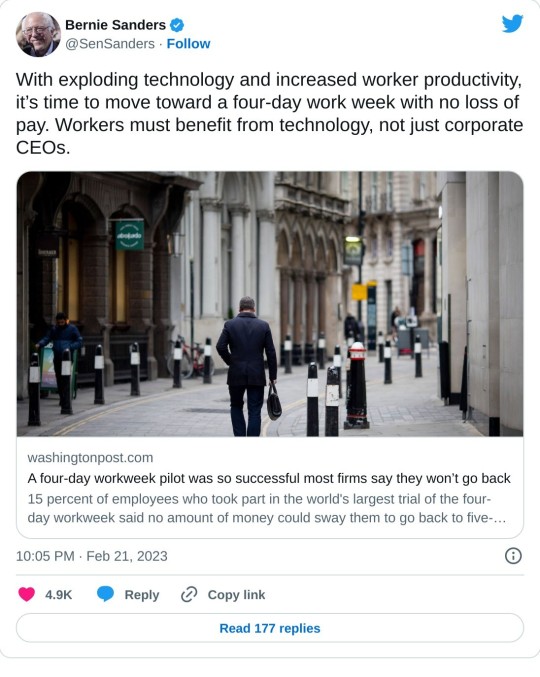
Sanders was referencing the latest findings out of the UK on the four-day work week. A large-scale pilot program, spanning over 3,000 workers, found that workers slept better, firms made more money, and employees were less likely to say they did not have enough time to care for loved ones.
As the Washington Post reports, most of the companies involved in the pilot plan on continuing to use a four-day work week.
The concept of a four-day work week has increasingly caught on over the last few years, with firms and researchers alike taking the plunge to cut back hours without reducing pay.
As Insider reported in December, 4 Day Week Global — a New Zealand-based nonprofit — conducted a study involving 33 participating companies that employed 969 people based in the US, Australia, Ireland, the United Kingdom, New Zealand, who adopted a four-day work week in a pilot program over a six-month period, and it found it was a "resounding success on virtually every dimension."
"Companies are extremely pleased with their performance, productivity and overall experience, with almost all of them already committing or planning to continue with the 4 day week schedule," the report said.
"Revenue has risen over the course of the trial. Sick days and absenteeism are down," it continued. "Companies are hiring. Resignations fell slightly, a striking finding during the 'Great Resignation.' Employees are similarly enthusiastic. And climate impacts, while less well-measured, are also encouraging."
Some US companies have started testing out the idea, as well. A Chick-fil-A owner in Florida launched a three-day work week in November, and he received 400 applications for just one job opening due to the popularity of a shortened workweek.
This isn't the first time a four-day work week has caught the attention of lawmakers — the Congressional Progressive Caucus previously endorsed the "32-Hour Workweek Act," with Caucus Chair Pramila Jayapal saying in a statement at the time that it's "past time that we put people and communities over corporations and their profits — finally prioritizing the health, wellbeing, and basic human dignity of the working class rather than their employers' bottom line."
Rep. Mark Takano, a Democrat from California, proposed that legislation. He previously told Insider that a 32-hour work week — which would become the new standard under his proposal — would help Americans craft the new normal of work that they've been demanding.
"I think there was a Great Realization among a lot of Americans — how hard they're working and that they wanted to move on from the jobs that they were working at," Takano said. "So a four-day work week is something that connects a lot of Americans."
#us politics#news#business insider#2023#sen. bernie sanders#Vermont#32 hour work week#4 day work week#twitter#tweet#progressives#progressive caucus#the washington post#4 Day Week Global#32-Hour Workweek Act#rep. pramila jayapal#Rep. Mark Takano#working class#working class solidarity#worker's rights
103 notes
·
View notes
Text
Countries that ban commercial surrogacy but allow altruistic surrogacy are by default allowing would be reproductive purchasers to guilt trip young women into inconveniencing herself for over a year when they could look into adopting.
MAY 31, 2024 - 1:10PM
Ireland has mummy issues. Nowhere is this more apparent than in the upcoming Assisted Human Reproduction Bill. The proposed legislation, which passed through the Dáil on Wednesday, would allow those who have been resident in Ireland for two years to hire women from a list of approved countries to serve as surrogates, gestating and giving birth to babies who will then be handed over to them.
The main body of the bill concerns the licensing of agencies engaged in international surrogacy and the establishment of new legal frameworks. So-called “intended parents” will have legal rights, even where the baby is born abroad, provided the child has a “genetic link to at least one” of them.
While the ban on commercial surrogacy remains in place, a “reasonable sum” can be offered, and it seems entirely likely this will open the door to pregnancy-as-employment. For example, legitimate expenses will include the loss of income by the surrogate mother for up to one year and the salary of a cleaner for the duration of the pregnancy. There are a range of safeguards in place to ensure that prospective surrogate mothers are not exploited, but whether these will be respected in jurisdictions outside Ireland remains questionable.
With fertility rates plummeting across the world, the baby-making business is set to boom; in 2022 the surrogacy industry was valued at $14 billion. Given the swelling commercial clout, it seems likely smaller countries will cave to domestic and international pressure by loosening laws.
The Irish bill will bring the country closer to the UK, which allows for altruistic surrogacy. Notably, while Russia and Ukraine have lax laws and effectively allow surrogate mothers to be paid, all forms of the practice are outlawed across much of Europe, including Italy, Spain, France and Germany.
Many of the bill’s proponents have heralded it as marking progress toward equality between same-sex and opposite-sex couples, toward a forward-looking Ireland free from the scandals of its Catholic past.
The bill’s righteous and progressive aims were cemented in January when the Pope called surrogacy “a grave violation of the dignity of the woman and the child, based on the exploitation of situations of the mother’s material needs.” “A child is always a gift and never the basis of a commercial contract,” he added.
Chair of the Fine Gael parliamentary party, Alan Farrell TD, swelled with pride during a debate on the bill as he reflected: “We have seen dramatic changes in women’s rights and LGBT rights in Ireland, led by the public and pursued by the Government. This bill is the latest where successive governments have sought to build on that progress and deliver real change that reflects more understanding and an equal country.”
A spokesperson from the LGB rights group “Not All Gays” told me that opposition to the legislation has been framed as “anti-LGBTQIA”. “When will they stop weaponising LGB’s struggles and genuine homophobia to push for ethically dubious laws that could be plucked straight out of Gilead?” she asked. “We are not your shield to be used to silence reasonable debate or opposition to laws that seek to erode the rights and civil liberties.”
Just as with the dissolution of women’s rights at the hands of trans activists, this most recent threat to women’s dignity, health and happiness has come cloaked in the rainbow flag. But in reality, it signifies nothing more than a social shift toward the commercialisation of women’s bodies.
It is a triumph of market forces, of the state-sanctioned use of wombs for the production of a designer accessory. Provided the mother meets the minimum requirements, couples and individuals who have commissioned babies will be able to pose with them for Instagram snaps as soon as the mother has given birth.
The bill will probably pass into law, and Ireland will become a land where virgins may indeed become mothers. It is conceivable that future generations will look back on the period of legalised surrogacy with horror as we now do the brutal homes where unmarried mothers had their infants ripped from their care.
Josephine Bartosch is a freelance writer and assistant editor at The Critic.
In the meantime
#Ireland#Anti surrogacy#Assisted Human Reproduction Bill#in 2022 the surrogacy industry was valued at $14 billion#Commissioning babies while 5500 children are in state care#Babies are not commodities#Surrogacy exploits women
9 notes
·
View notes
Text
Women in the public sector are quitting their jobs due to being blocked from working flexibly with three in ten seeing their requests rejected, according to a major new study.
Researchers at Unison, the UK’s largest trade union, who polled just over 44,000 women working across the public sector, found three in ten working in hospitals, schools, care homes, town halls, police stations and other key services had pleas to work flexibly denied.
Some women said employers told them to leave their job or use annual leave if they want to work flexibly, while others report their requests were immediately blocked on the same day they were put in. Struggles to access flexible working meant some women had quit their jobs, researchers warned.
Christina McAnea, Unison’s general secretary, said: “Too many employers are still turning down flexible working requests, which means the right to request is pretty meaningless for many women. The right to work flexibly from day one would be beneficial for staff and employers alike, and help bring workplaces into the 21st century.”
Helping women juggle work with childcare and caring for loved ones can enable workplaces to recruit for jobs which are tricky to fill and likely boost the quality of public services, she added.
Ms McAnea said: “It’s disheartening to see many employers continuing to deny their staff the opportunity to work flexibly. They have nothing to lose and everything to gain.
"But sadly many women who find they need to inject some flexibility into their working lives are coming up against employers with inconsistent, rigid and unimaginative attitudes. While there’s no one-size-fits-all solution, some form of flexible working is achievable in most workplaces.”
A quarter of those women who were informed they could not change their working conditions say their requests were rejected on a number of occasions.
Researchers also found more than two fifths of women were told they could not work flexibly because doing so would harm the service being provided, while almost three in ten were informed there would not be enough colleagues to cover for them.
A fifth had their request rejected due to managers saying doing so would result in colleagues making similar pleas, while around one in seven were not provided with a reason by their employer.
New flexible working legislation comes into force in April which gives employees a statutory right to ask for flexible working from day one at a new job. While this is an improvement on the current wait of six months to ask, Unison warn employers are too easily able to block flexible working requests.
Emily*, who works in the energy sector, said she only managed to get her flexible return to work from maternity leave agreed just before she was due to return to work.
“The process was horrendous,” she said. “I had to submit several requests and they were all turned down within days. I was stunned. I was caring for my baby and having huge levels of anxiety simply trying to get some flexibility at work. I was scared I’d lose my job. It dragged on so much I couldn’t sort out childcare. The process left me traumatised.”
While Nadia*, a local government worker with a disability, was blocked from working flexibly even though she had medical notes written up by her doctor.
“I had a very supportive manager during the pandemic and we all worked well during that time,” Nadia, a single mother of two, added. “But as the situation eased, my new manager suddenly wanted everybody in the office all the time. Daily attendance then worsened my condition and I had to go off sick for a few months to recover. Being able to work from home on the days I’m struggling would make a huge difference, and also make it easier to look after my children.”
Helen*, a specialist nurse and single mother of three, explained she was repeatedly blocked from working flexibly.
She said: “I had to go down a pay band to get some flexibility, which put me and my family in financial difficulty. I was told if they allowed me to work flexibly they’d have to do the same for others. But others aren’t in my situation.
“I'm a survivor of domestic violence and have no family support. The process was awful and I was made to feel like a massive inconvenience. Now I don’t want to be a nurse any more and am looking for a new job in retail. I’ve had to take time off because of the stress and anxiety I experienced. It shouldn’t be like this as I do love my job.”
*Names changed
12 notes
·
View notes
Text
So here we are. Kemi Badenoch is the leader of the Conservative party. That’s another couple of firsts that the Tories have beaten Labour to. So far, the Conservatives have elected the first Asian leader and prime minister, and the first female Black leader of any major British political party.
But as these firsts started to come quicker and closer together – we now have a brown party leader handing over to a Black one – two things have happened. One, the politics of the party has become more unhinged and its electoral record has tanked. And two, the profile of these mould-breaking new leaders has become more extreme. The two are not unrelated to the success of ethnic minorities in the Tory party. I am sorry to point this out, because there is a sort of ritual now that must be observed when the Tories do well on diversity: you must not speak ill of a person of colour who has been elected to a position of leadership for the first time, and the significance of that moment, above all else, should be respected.
That ritual now has become a sort of farce. Because many things are staring us in the face while we are asked to perform some perfunctory ceremony of celebration. The ritual now even has its own incantation: “putting politics aside” or “whatever you think of their politics”, you must say, we must recognise that this is a good day for British politics and society in general. I’m not clear how you can “put politics aside” when it’s Badenoch’s actual job, and when her record is so appalling. I mean, it’s Kemi Badenoch. And her job is leader of the opposition.
This is the woman who said that “not all cultures are equally valid”, when deciding on who is to be allowed to enter the UK. Who said that autistic people undeservingly receive “better treatment” and economic “privileges and protections”. Who thinks that maternity pay is “excessive”. That online safety regulation is “legislating for hurt feelings” and that net zero commitments are “unilateral economic disarmament”. And who has dedicated much of her career so far to pugnacious culture warring.
And if you were to just take a glance at what her elevation means to the ethnic minority from which she comes, I am afraid that there is not only little to celebrate, but a lot to worry about. Take Badenoch on colonialism (she doesn’t care about it); on Black communities (she thinks no such thing exists, a neat echo of Thatcher’s “no such thing as society”); and on racism (when Black people are in the wrong job, in her experience, they just think their employer is racist).
But you must park whatever you think of that, and acknowledge that this is a good day because it says something about diminishing barriers to the rise of people of colour today. What that obscures is the specific circumstances of that rise, and of which people in particular. It’s not just anyone who gets to the top in British politics, but those who adhere to a particular story – one in which their experience, success and racial identity allow them to undermine the concerns of other ethnic minorities and attack those minorities for not toeing the line in terms of their “integration” or political values. (Badenoch says that “ancestral hostilities” make some immigrants “hate Israel”.) It seems that successful candidates, because of their identity, can do the wider work of Conservatism when it comes to race in a way that their white counterparts are not able to without annihilating the veneer of respectability that distinguishes the Conservatives from the far right.
And the circumstances are also troubling. Kemi Badenoch, like Rishi Sunak, ran before as party leader and was dismissed out of hand. And like Sunak, she was only considered when the party’s prospects had dwindled. It’s an awkward question and again I am sorry to pose it while we are in the customary grace period of putting politics aside, but does there not seem to be a correlation between electing ethnic minorities as party heads, and a recent deterioration of the party’s performance internally and at the ballot box? The implication is that when the party is not really in serious play, it can afford to experiment with new people who wouldn’t have been quite the right profile in more bountiful times, and see where it goes.
It’s a lot to reckon with, I know, when there is a far simpler moment to land on, a far simpler story of racial success to grasp on to. If you had told me 10 years ago that we would have a brown prime minister and a Black female leader of the Tory party, I would have imagined a far less flat and dispiriting scenario.The Tories’ record on elevating problematic people of colour has accelerated quicker than society’s understanding that people of colour can be problematic too – and that it’s OK to say so. The party’s degrading effect on social cohesion over the past decade is far too clear now for any of us not to realise that this is the way the status quo works. Its very power lies in constantly expanding the profile of people included in the establishment so that they may stabilise it, by diversifying it.
Badenoch has the right to have whatever opinions she wishes, but it is also the right of others to feel excluded by them, and not be scolded for refusing to cheer an appointment that is at best meaningless, and at worst perturbing.
Badenoch’s election is a first that signifies nothing. But it is useful, because it forces us to confront the fact that representation does not happen simply by elevating women or people of colour. True representation requires specific people and specific circumstances that do something other than merely continuing, or indeed entrenching, the way things already are. It’s a curveball for sure. But we can catch it. And catch up.
4 notes
·
View notes
Text

youtube
Why We Should Abolish Hate Speech Laws - Andrew Doyle
Since when did it become the business of the state to audit our emotions?
In effect, this is precisely what's happening by means of the various "hate speech" laws that have been implemented throughout Europe in recent years. In Ireland, the imminent "Criminal Justice" bill would represent one of the most draconian forms of hate speech legislation yet produced.
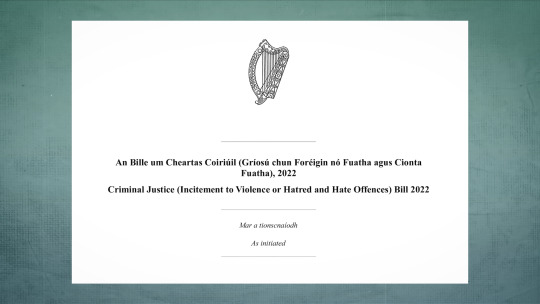
And how is hatred defined in the bill? Well, the following is a direct quotation: "'hatred' means hatred against a person or a group of persons in the state or elsewhere on account of their protected characteristics or any one of those characteristics."
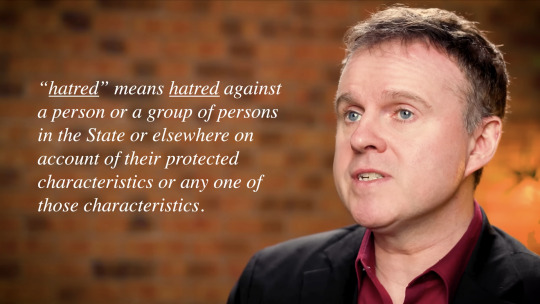
So, hatred means hatred. Glad we cleared that up. This kind of circular definition is what we've come to expect from legislators when it comes to this most nebulous of concepts. In his book "Censored," Paul Coleman helpfully includes all of the existing legislation on hatred from across Europe. And in doing so, he reveals that no two governments are able to agree on its meaning.
In 2012, the European Court of Human Rights concluded that there "is no universally accepted definition of the expression 'hate speech'" and a manual published by UNESCO in 2015 accepted that "the possibility of reaching a universally shared definition seems unlikely."


When it comes to the statute books, one would have thought that precision and detail would be of paramount importance. After all we've seen how vaguely worded legislation is wide open to exploitation. Consider, for instance, how trans rights activists are now claiming that the reference to sex in the "Equality Act 2010" connotes a sense of "gender identity" rather than, you know, the biological designations of male and female.
If the state is empowered to imprison its citizens on the basis of "hatred," surely we need to know what that means. Hatred, like any other emotion, cannot be legislated out of existence. Will we be seeing laws against envious speech on the statute books? And what about codes against wrath or pride? If the government were to prohibit narcissistic speech, most of the flag waving pronoun-declaring gender ideologues would have to be incarcerated. And while this would doubtless create a much more sane and serene society, it would also involve the obliteration of our fundamental values.
As for "hate crimes," there is no need for mind reading in order to determine the appropriate punishment. If I'm physically assaulted, it makes little difference to me if the assailant was motivated by homophobia. I would prefer the sentence to reflect the crime itself, not to be moderated according to speculations about the perpetrator's private thoughts. The state should have absolutely no license to probe inside our heads, any more than employers should insist on compulsory unconscious bias training.
In a free society we are entitled to think and feel as we see fit, and so long as that does not interfere with the liberties of others, that includes the right to hate. But even if one were to accept the premise that the state must crack down on hateful thoughts, which I most assuredly do not, "hate speech" legislation is holy ineffective.
Censorship of hateful ideas does not cause them to disappear. It drives them underground where they can fester unchallenged. Moreover, "hate speech" laws are easily weaponized by activists seeking to silence their political opponents. For example, in the UK, we have seen people arrested for "misgendering," that is to say, for accurately identifying the sex of another person.
The journalist Caroline Farrow was investigated by police for 6 months after an appearance on Good Morning Britain. According to a complainant, Farrow had referred to another contributor's female-identifying child with a male pronoun during a conversation that took place off-air. And although such instances have not led to convictions, we all know that the process is the punishment.

As one who has received my fair share of abuse online, I understand that free speech has its downsides. But I choose to ignore those of the obnoxious and hateful ilk, rather than call for them to be censored. The price we pay for living in a free society is that unpleasant people are going to say unpleasant things. But their right to do so is precisely the same right that allows us to counter them. If we attempt to silence even our most abusive critics, we are essentially surrendering our principles at their behest.
No doubt the trans-identifying individual who was described as a "faggot with tits" in a recent case in Spain didn't relish the experience. But it should concern us all that the state has intervened and sentenced the woman who posted the offending words to 6 months in in prison, suspended on condition of the payment of a €3,850 fine. In addition, she's been banned from employment in teaching and sports for three and a half years. This is the very definition of authoritarian overreach.

[ *Ironic correction - Both the complainant and the offender were "trans-identified" males. ]
Those who are skeptical of gender identity ideology are particularly susceptible to the misapplication of hate speech laws and there is no way of knowing which other beliefs will eventually be criminalized. Once a state has outlawed "hatred" and failed to define it, the law becomes a cudgel to beat anyone who holds heterodox points of view. Who is to say that a future government might not deem it "hateful" to criticize its policies? What starts with the chilling of free speech ends with the criminalization of dissent.
A new law in Canada, for instance, Bill C63 empowers the state to imprison a citizen for life for "advocating genocide." But of course, activists and even politicians have insisted that claiming biological sex is real and immutable is a form of "trans genocide." On the hands of authoritarians these words are very slippery. They can mean whatever they want them to mean.
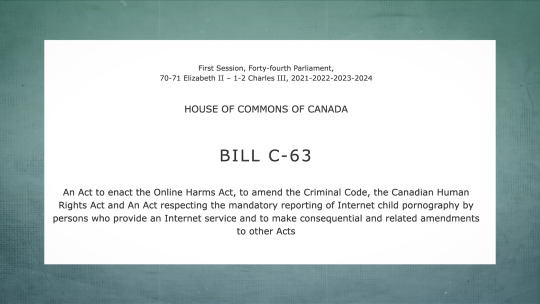
And that's why we should be so worried about free speech in Ireland. Last year the Irish Green Party senator Pauline O'Reilly made no effort to disguise the authoritarian nature of the new bill.
"That's exactly what we're doing here, is we are restricting freedom. But we're doing it for the common good."

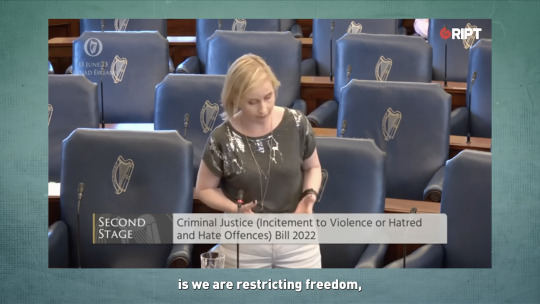

Hasn't every tyrant in history made an identical claim? In her speech, O'Reilly invoked the notion of safety to justify state censorship. "If your views on other people's identities go to make their lives unsafe insecure and cause them such deep discomfort that they cannot live in peace," she said, "then I believe it is our job as legislators to restrict those freedoms."

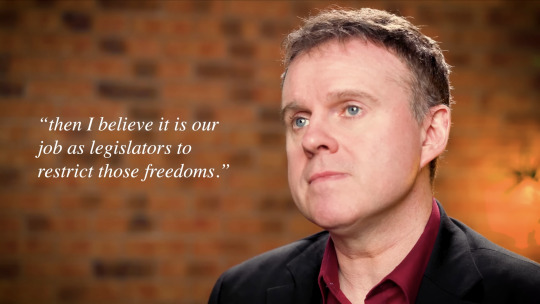
Well. it's a common tactic of activists to claim that certain opinions make them feel "unsafe" as a means to provoke a censorial response either from employers or from the state. But this is linguistic sleight of hand and the strategy has been remarkably effective.
The Irish "hate speech" bill goes further than most of its equivalents in European countries. It will give the state the right to prosecute those who cause offense under the catchall of "inciting hatred." And those found guilty could face up to 5 years in prison. Even more worryingly, a citizen can be jailed for 2 years simply if they "prepare or possess" material that could potentially incite hatred. So, if you have a gender-critical meme on your iPhone, that could be sufficient to see you in jail.
In the UK, "hate speech" laws exist in the form of the "Public Order Act 1986" and the "Communications Act 2003." 3,000 people are arrested each year in the UK for comments posted online that have been deemed offensive. And in some cases have even been imprisoned for jokes.
If we're going to tackle this problem, we might start by repealing section 127 of the Communications Act, which criminalizes online speech that can be deemed "grossly offensive." Of course, no attempt is ever made to define "grossly offensive" in the legislation, so anyone could be vulnerable.
In Scotland, the situation is even graver. When First Minister Hamza Yusuf was Justice Secretary, he was instrumental in the passing of the Hate Crime and Public Order Act, and disturbingly, these new laws can see citizens prosecuted for words that they have uttered in the privacy of their own homes. I'm reminded of a speech by William Pitt the Elder, delivered in the House of Commons in March 1763.
"The poorest man may in his cottage bid defiance to all the forces of the Crown. It may be frail, its roof may shake, the wind may blow through it, the storm may enter, the rain may enter, but the King of England cannot enter. All his force dares not cross the threshold of the ruined tenement."

Evidently, these sentiments would not be echoed by the SNP. Given that hatred and offense are entirely subjective concepts, we should be resisting any attempt to codify in law restrictions against them. No two figures of authority will interpret these terms in the same way. And as human beings with frailties and biases, they will doubtless be tempted to wield such laws against their detractors.
If the state is willing to dispense with our right to free expression, there can be no guarantees for any of us. "Hate speech" laws are an affront to human liberty. It's time to ditch them for good.
#Andrew Doyle#Triggernometry#hate speech#hate speech laws#free speech#freedom of speech#hate crimes#thought crime#censorship#freedom of thought#religion is a mental illness
8 notes
·
View notes
Text


On 18th September 1972, BBC News reported that the first 193 Ugandan refugees, fleeing persecution by the country’s military dictatorship, had arrived at Stansted Airport, Essex. Over half of the arrivals had British passports, and housing and immediate needs would be overseen by the Ugandan Resettlement Board.
Uganda’s Asian community, numbering around 55 000, many of whom ran family businesses and small enterprise, were ordered in August 1972 to leave the country within 90 days by President Idi Amin. Amin had publicly denounced Ugandan Asians as ‘bloodsuckers’, threatening that any who had not left by the arbitrary deadline of November 8th would be interned in military detention camps.
Many of the initial flight of refugees had endured frightening experiences prior to their departure from Uganda, at the hands of Amin’s troops. "On the way to the airport the coach was stopped by troops seven times, and we were all held at gun point," one refugee told reporters. Another stated that he had been robbed of personal valuables and Ugandan currency on the way to Entebbe airport.
News reports at the time cited some opposition within the UK over the acceptance of the Ugandan Asians. The Leicester local authority mounted a newspaper campaign urging refugees not to come to their region seeking jobs and housing. The BBC asserted that, in hindsight, the resettlement programme was seen as ‘a success story for British Immigration’.
The loss of the hardworking and successful Ugandan Asian community devastated Uganda’s agriculture, manufacturing and commerce. Idi Amin was deposed in 1979 and died in Jeddah in 2003, having been responsible for the deaths of as many as 300 000 Ugandan civilians during his reign of terror as President. In 1991, Ugandan President Yoweri Museveni invited the expelled community to return home to help rebuild the economy.
The Wilson Labour government also had to grapple with a refugee crisis from a former African colony.
In February 1968, BBC news reported;
"…Another 96 Indians and Pakistanis from Kenya have arrived in Britain, the latest in a growing exodus of Kenyan Asians fleeing from laws which prevent them making a living…"
Many Asian people living in Kenya had not taken up Kenyan citizenship following the country’s independence from Britain in 1963, but possessed British passports. Under Kenya’s Africanisation policy, non-citizens required work permits, and were being removed from employment in favour of Kenyan nationals. There was growing public demand for laws to prevent non-citizens from owning businesses or even operating as street and market traders. As a result, British passport holders were leaving Kenya at the rate of 1000 per month, leaving a huge deficit in skills and experience within the business community and civil service.
Fearing a backlash over the large numbers of Asian immigrants, Home Secretary, and future Prime Minister, James Callaghan, rushed through the Commonwealth Immigration Act, which made it a requirement that prospective immigrants must have a 'close connection' with Britain.

This led to disagreement in Cabinet, with Secretary of State for Commonwealth Affairs, George Thomson (1921-2008) arguing;
"…To pass such legislation would be wrong in principle, clearly discrimination on the grounds of colour, and contrary to everything we stand for…"
In 1971, the Heath government made further legislative changes that would mean that (some) immigrants from Commonwealth countries would be treated no more favourably than those from the rest of the world, and that tightened restrictions on those who stayed by linking work permits to a specific job and location, requiring registration with police, and reapplication to stay in Britain each 12 months.
The Patrial Right of Abode lifted all restrictions on those immigrants with a direct ancestral connection with Britain.

Home Secretary Reginald Maudling (later famous for being smacked in the face by Irish MP Bernadette Devlin, and for having to resign over a corruption scandal linked with disgraced property developer John Poulson) denied that this was, in effect, a 'colour bar', telling the BBC;
"…Of course they are more likely to be white because we have on the whole more whites than coloureds in this country, but there is no colour bar involved…"
Unsurprisingly, not everyone was convinced.
Vishna Sharma, Executive Secretary of the Joint Council for the Welfare of Immigrants, described the bill to BBC News as, "basically racially discriminatory, repressive and divisive," and added, "It will create divisions amongst the Commonwealth citizens already living in this country on patrial and non-patrial basis. It will create day-to-day bureaucracy and interference on people living in this country. It will create more hardship for people wanting to enter into this country."

(Source; BBC reporting and history.com. Photo Credits; BBC News)
#social history#uk politics#working class history#social justice#uk government#human rights#uk history#british culture#society#history#race relations#immigration
27 notes
·
View notes
Note
As I understand it, Good Omens Season 2 has wrapped production and won’t be affected by the WGA strike in the States. But I was wondering— and this is by far my most reasonable avenue to ask someone with knowledge and authority on the subject— would an American union strike affect a British production significantly? How many American writers and crew members are usually working on-set? Would you have considered stalling GOS2 production in solidarity with an overseas strike? I don’t mean to push you towards being overly speculative— I suppose I’m just interested in how far the WGA picket line extends internationally.
Good Omens 2 wrapped production in March of 2022. While we were shooting we had an American producer, and in the cast we had American Jon Hamm, but most of the other people in the cast and crew were British.
Under British law it would have been illegal to have struck in solidarity with an overseas strike.
From the WGGB site:
Trade union legislation is very different in the UK.
Secondary strike action (action in support of another union or group of workers) is not permitted under UK law, nor is the practice of restricting employment to those who are members of a particular trade union.
UK writers can take other action in support of the WGA, for example, taking part in protests or demonstrations that do not fall under the definition of ‘picketing’.
On the other hand, I'm WGA so I would have gone on strike, if the strike had occurred while we were shooting or editing, which would have meant that no writing or rewriting could have occurred (and every week I would get what we were shooting that week, and every week would do any rewriting that needed doing, sometimes every day, and sometimes while we were shooting I'd be rewriting or fixing something) and I wouldn't have been in the edit or in ADR sessions, because they can involve writing.
My understanding of US shows filming in the UK, like Rings of Power or House of the Dragon, is that they are able to shoot scripts already written, but that no rewriting can occur.
(GO2 was finished and handed in in March of this year. It's all done and Amazon will be releasing it in the Summer, so it's all a bit hypothetical trying to what if the strike was happening now. I think it would have been made, it just wouldn't have been as good.)
952 notes
·
View notes
Text
💙🤍CHARITY ANNOUNCEMENT💙🤍

We are so thrilled to announce that we will be donating the funds of this zine to Mind!
Mind is a mental healthy charity based within the UK who help people who struggle with their mental health find help, connect them with others who can help and campaign for changes in employment, legislations and healthcare. 💙
Find out more about the work they do here: https://www.mind.org.uk
13 notes
·
View notes